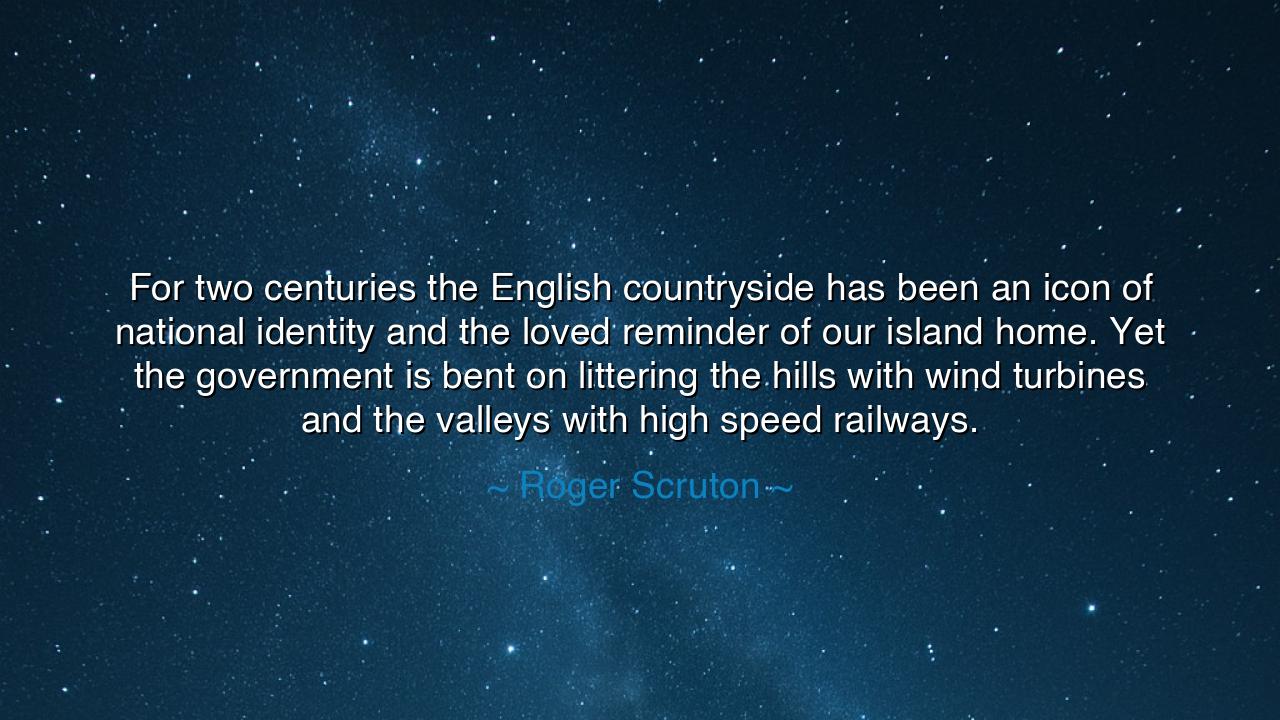
For two centuries the English countryside has been an icon of
For two centuries the English countryside has been an icon of national identity and the loved reminder of our island home. Yet the government is bent on littering the hills with wind turbines and the valleys with high speed railways.






The philosopher Roger Scruton, that gentle guardian of English tradition, once lamented: “For two centuries the English countryside has been an icon of national identity and the loved reminder of our island home. Yet the government is bent on littering the hills with wind turbines and the valleys with high speed railways.” His words are not merely a protest against modern construction; they are an elegy for a vanishing soul — the spirit of place, the living bond between a people and the land that raised them. To Scruton, the English countryside was not a backdrop of scenery, but a moral landscape, shaped by centuries of stewardship, patience, and love. He feared that in the name of progress, men were destroying not just fields and forests, but the invisible threads of identity, memory, and belonging that tied them to their ancestors.
To understand the meaning of this quote, we must grasp Scruton’s philosophy of “home.” He believed that civilization is not sustained by ambition or machinery, but by the quiet reverence that people hold for their homeland. The countryside, in his eyes, was a mirror of the English soul — a place where restraint, continuity, and beauty coexisted with labor and simplicity. Each hedge, each hill, each stone cottage told a story written not by governments, but by generations who built with care, who cultivated the soil not as masters but as custodians. When such a landscape is replaced by cold metal and noise, something deeper than beauty is lost — the sense that man belongs to the land, not merely on it.
The origin of this quote lies in Scruton’s lifelong defense of what he called “oikophilia,” the love of home. He saw in modern politics — both left and right — a dangerous impatience, a belief that progress is measured only by speed and scale. High-speed railways, wind farms, industrial sprawl — these were, to him, symbols of a civilization that had forgotten reverence. He was not against energy or technology, but against the spiritless utilitarianism that valued efficiency over meaning. For two centuries, the English had seen their landscape as a part of who they were. Now, Scruton feared, they were trading it for a future that could no longer feel the poetry of the past.
History offers us a reflection of this struggle in the story of John Ruskin, the 19th-century art critic who opposed the industrial pollution of England’s green hills. Ruskin warned that factories and railways were “defiling the countenance of God’s earth.” Yet his words were dismissed as sentimental in his time — just as Scruton’s often were in ours. And yet, generations later, Ruskin’s call for beauty and preservation inspired movements that saved England’s natural heritage from ruin. The National Trust, founded to protect landscapes and historic places, was the fruit of that spirit of resistance. So too does Scruton’s warning call to us now: progress without reverence is not civilization, but desecration.
In this light, Scruton’s lament becomes not reactionary, but prophetic. He does not deny the necessity of development; he pleads for the preservation of meaning within it. The true danger lies not in wind turbines or railways themselves, but in the mindset that sees the land as a blank slate for profit and power. For when men forget the sanctity of place, they lose their sense of rootedness, and with it, their sense of duty. A culture that builds without memory soon finds it has built a world without soul.
The lesson here reaches beyond England’s shores. Every nation has its sacred landscapes — the rice terraces of Asia, the deserts of Arabia, the forests of Europe, the plains of Africa — each one bearing the imprint of those who came before. To destroy them carelessly is to wound the collective heart of a people. The call of Scruton’s words, then, is to balance progress with preservation, innovation with reverence. We must remember that technology serves man, not the other way around, and that the beauty of a nation’s land is as vital to its strength as its laws or armies.
So, my child, when you walk through your homeland — through the meadows, mountains, or streets that raised you — pause and listen. The earth beneath your feet speaks the language of those who built before you. Honor it. Let your progress not be destruction, but continuation; let your inventions not erase the past, but harmonize with it. For a people who forget the meaning of their land will soon forget the meaning of themselves. And in that forgetting, the very soul of civilization begins to fade.






AAdministratorAdministrator
Welcome, honored guests. Please leave a comment, we will respond soon